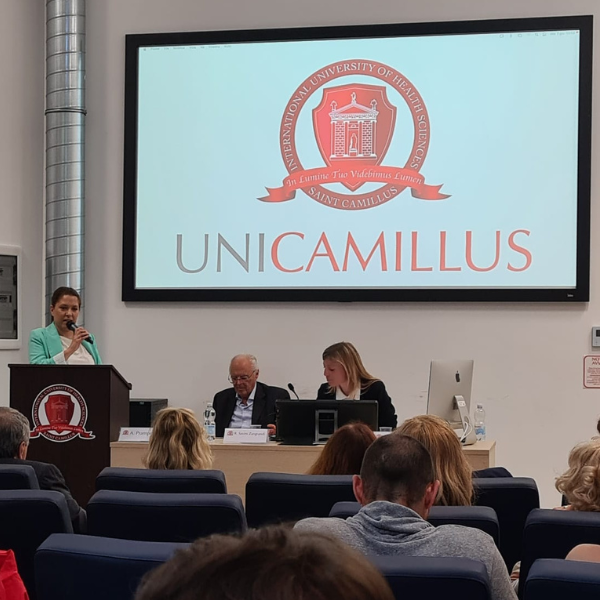Non-profit organisations and the business world can cooperate. This theme, which is still seen in some areas as almost a taboo for often purely ideological reasons, was instead addressed with a constructive spirit on Wednesday, June 7th, at a conference organised by the UniCamillus Management Academy UMA – Social Impact, in collaboration with Compassion Italia. In the UniLabs’ main lecture theatre the following speakers took their turns: Alessandra Prampolini, General Director at WWF Italy; Arianna De Leo, Head of Strategic Philanthropy at UNICEF Italy; Stefania Martinelli, representative of Cegos Italy SpA; Filomena Pietrantonio, Professor of Internal Medicine at UniCamillus and former President of Doctors Without Borders; Marco Crescenzi, President of the Social Change School; and Massimiliano Monnanni, Head of CSR – Sustainable Development and Risk and Compliance at Gruppo POSTE Italiane SpA.
After the opening address led by the Rector, Prof. Gianni Profita, a round table discussion entitled Profit and Non-Profit Partnership, ESG, and new models of sustainability was held and moderated by Federica De Benedictis, Strategic Philanthropy Consultant. This was unanimously judged by the participants to be an enriching moment to share different experiences and perspectives in different contexts and clarify why a company can approach a non-profit organisation.
The proceedings were opened by Dr. Roberto Savini Zangrandi, Executive Board of Compassion for Italy and Spain, and Professor Mario D’Ambrosio, Director of the UniCamillus Management Academy. The promotion of this event by UniCamillus strengthens the Third Mission action that the University carries out in the humanitarian strategic area. The intention is to initiate medium to long-term planning of scientific initiatives, also thanks to partnerships, specifically within the framework of the Third Mission, to exert a socio-economic impact at a national as well as international level. “The exchange of experiences and different approaches, in my opinion, is very significant”, said Professor Filomena Pietrantonio. “I think it can promote the development of shared research activities, even in an academic context”. The meeting represented an important opportunity for dialogue and cooperation with the possibility of achieving development and growth for all the parties involved. Organisations with different natures and purposes can still work closely together to create favourable conditions to achieve their objectives, all within a framework of sustainable development.
“I believe that these are important initiatives to bring the profit and non-profit worlds closer together”, said Ms Annalisa De Leo. “We must stop entertaining the idea of organisations only looking at the private sector as potential donors, when they can actually become true partners to collaborate and work with. These initiatives are an opportunity for mutual contamination, as they help bring together different parties and multiple possibilities for collaboration”. Ms Alessandra Prampolini shared the same sentiment: “The culture of collaboration between the profit and non-profit sectors must spread more widely. It is impossible without collaboration between all parties to push society forward, from institutions to individual citizens, passing through the backbone of the productive world”.
The central theme of all the talks concerning the collaboration between profit and non-profit organisations was the Global Partnership for Effective Development Cooperation document, which was drafted in 2019 and emphasises the importance of involving the private sector in the implementation of the UN’s 2030 Agenda for Sustainable Development Goals (SDGs). For businesses, in particular, this collaboration materialises through investments in individual and organisational well-being, while the returns come from the perspective of motivation, belonging, and attractiveness of one’s work. “In our experience”, added Ms Stefania Martinelli, “we have chosen partners who are consistent with our corporate mission, our values, and our goals (Cegos is involved in managerial training). We have chosen to send a message to our internal resources to make ourselves attractive to the outside world as well. Today, we are witnessing the change of an era, with people looking for jobs that align with respect and social responsibility. But we also want to become attractive to our customers who share our same mission and therefore see in a supplier or generic business partner a consistency of values and social respect”. The morning session ended with a speech by Professor Donatella Padua, UniCamillus Delegate for Third Mission and Social Impact.

